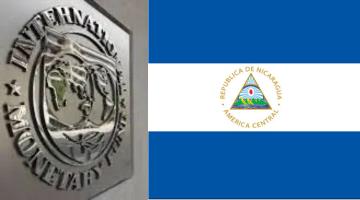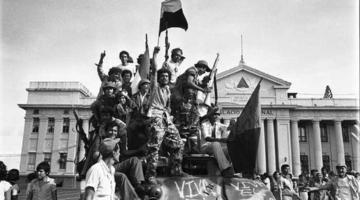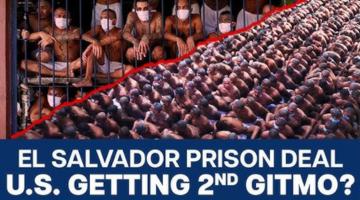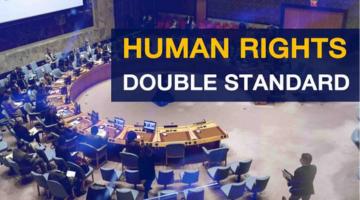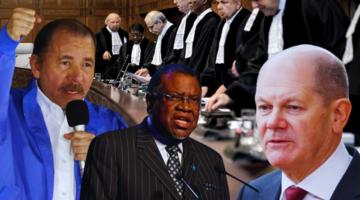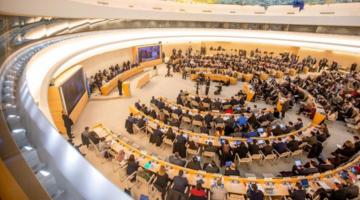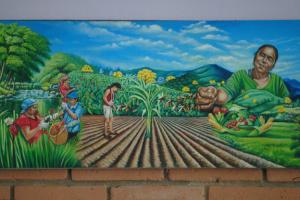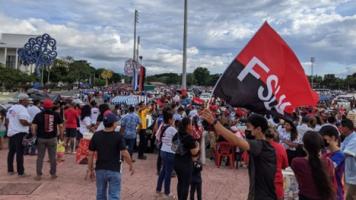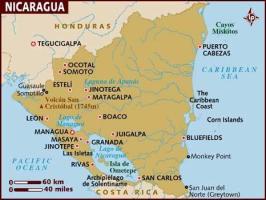Left Photo: Inmate in Nicaragua receives diploma (19 Digital). Right Photo: Inmates dehumanized in El Salvador (El Salvador Presidency handout/Anadolu/Getty Images)
Ortega and Bukele are polar opposites: one invests in dignity and democracy, the other in mass incarceration and imperial alliances.
Opposition media from both Nicaragua and El Salvador, along with the Washington Post, Amnesty International, and Human Rights Watch, all vilify Nicaraguan President Daniel Ortega by equating him with Salvadoran President Nayib Bukele. Although Ortega and Bukele are both serving consecutive terms, and a Central American polling firm reports that they enjoy high popularity among their respective populations, the two presidents actually offer a study in contrasts.
Crime and punishment
Bukele is praised for drastically reducing violence in El Salvador, but his political career is actually based on perpetuating it. First, some history. The country’s gang problem originated in the bloody US-supported war of the 1980s, including US and Israeli funding and training of death squads, that forced thousands of young men to escape forced military recruitment by fleeing to the United States. As an underclass of undocumented immigrants, and without the support of their families, many of these young men wound up in gangs on the streets of Los Angeles or in its prisons. In the mid-1990s, thousands of these gang members were deported to El Salvador, bringing violence back to a country that had just lost 75,000 lives in a brutal conflict. As Hillary Goodfriend writes, “the devastated neoliberal economic landscape proved fertile terrain for the US gang culture imported by Salvadoran youth deported from Los Angeles in the mid-1990s.” The right-wing Nationalist Republican Alliance (ARENA) governments of the postwar years responded to the gang problem with an iron fist.
Then from 2009-2019, while the former guerrillas (Frente Farabundo Martí de Liberación Nacional—FMLN) were in office, a preventive approach was attempted. Structural problems were addressed with “unprecedented increases in social spending, including critical education, health care, land, infrastructure and agricultural investment.” But these efforts were frustrated by a majority opposition legislature that limited spending on such programs, and USAID funding for a private sector approach that favored the opposition. The FMLN also made its own mistakes, including secret negotiations (along with the Catholic Church) for a gang truce, which was initially successful but politically costly once it fell apart. Still, progress was made as Salvadoran youth found more alternatives.
Nayib Bukele arrived on the national scene as the FMLN candidate for mayor of San Salvador in 2014. There has been suspicion that his political rise was based on secret deals with the gangs, and an increasing number of international media are giving details on how that worked. He is alleged to have bribed the gangs for their loyalty in that mayoral race, outbidding the ARENA candidate by a two to one margin. Bukele soon broke with the FMLN and ran against the party in the 2019 presidential election. MS-13 gang leaders are alleged to have negotiated with him prior to the vote, demanding an end to extraditions to the US, shortened sentences, and control of territory. In return they reduced the homicide rate by hiding their crimes. After Bukele’s election, the official murder rate fell, but disappearances went up. This gang also helped him get out the vote for his legislative supermajority in 2021, sometimes violently. While he colludes with the gangs in secret, the public face of Bukele’s crime policy is a return to the repression of the ARENA years.
In March 2022, Bukele instituted a state of exception which persists to this day and has led to the imprisonment of an additional 85,000 people, giving El Salvador the highest incarceration rate in the world. Several social movement leaders are among those detained without trial. Meanwhile, many Salvadorans enjoy comparative safety in the country’s streets since the gang violence is less visible and small businesses no longer have to make extortion payments. This, along with savvy manipulation of social media, has made the president extremely popular among a segment of the population, particularly voters living in the diaspora. Now Bukele has gleefully agreed to serve as an offshore jailer for Donald Trump, and seems to delight in images of dehumanized inmates in crowded cells, indicating that they will never leave. Conditions are torturous and rehabilitation is non-existent. As Alan MacLeod reports, “cruelty is the point.” And violence persists.
The photos at the top of this article show the stark contrast in attitude towards prisoners in Nicaragua vs. El Salvador. While Bukele serves cruelty and humiliation, Nicaragua’s Daniel Ortega focuses on human dignity and rehabilitation—particularly through education. A recent article tells of some 8,400 inmates enrolled in university studies, vocational programs, and completing primary and secondary schooling. Inmates are also allowed to work, if they so choose, and their earnings are sent to their families. Sentences are frequently reduced for good behavior. Reconciliation is a hallmark of the Sandinista movement, which abolished the death penalty in 1979. Corporate media stories about “political prisoners” are part of a US-funded propaganda campaign and should be viewed skeptically. This article gives information about the heinous crimes committed by those US media heroes.
In Nicaragua there is minimal gang activity, drug trafficking, and drug abuse. At 6 per 100,000 inhabitants, the country’s homicide rate has been declining since 2007 and is currently just below that of the US. This decrease is thanks to successful implementation of the kinds of social programs the FMLN attempted in El Salvador, which have engaged the youth and greatly reduced poverty. It has been a steady, long-term process that prioritizes the formerly impoverished majority; not an illusion for social media. People are empowered by creative programs that help farmers feed their families and communities, support entrepreneurs in starting a business, promote women’s health and safety, reinstate rights to Afro-descendant and Indigenous peoples, and allow Nicaraguans of all ages to get an education. These are not changes that can easily be turned back, and are the reason that Daniel Ortega keeps getting a larger and larger percentage of the vote in each election.
NGOs
The Washington Post and Amnesty International inaccurately equate El Salvador’s new Foreign Agents Law with Nicaragua’s non-profits law. The Nicaraguan law requires organizations to report payments coming from outside the country and tell how such money is spent, prohibiting the use of foreign monies for political activity. It is meant to curtail foreign interference like the 2018 coup attempt that subjected the Nicaraguan population to three months of politically-motivated terror. This article provides detailed documentation of the extensive flow of USAID regime-change money to Nicaraguan opposition and media outlets before 2022. In a shameless admission that they are still dependent on US funding, the Nicaraguan opposition took to social media at the start of the second Trump administration to decry the crisis they had fallen into because their US funding was cut. Contrary to what the Post and Amnesty would have us believe, media outlets dependent on US government funding are not “independent.” Unfortunately, USAID/NED funding for Nicaraguan opposition media operating outside the country has already been reinstated.
El Salvador has also been targeted by USAID in the past for political purposes, including during the FMLN administrations. US meddling is less likely to target Bukele, given his close alignment with the Trump administration. Criticism of the new law’s provision to charge Salvadoran charities a 30% tax on international donations does seem valid. In Nicaragua, most charitable organizations pay a 1% administrative fee on international donations, while the wealthiest charities pay up to 3%—a far cry from Bukele’s 30% tax.
Treatment of Migrants
Ortega never participated in the schemes the Trump and Biden administrations negotiated with Nicaragua’s northern neighbors to inhibit the flow of migrants; nor did he impose a ‘special fee’ on migrants in transit from Africa, as Bukele did. Nicaragua accepted direct flights from Haiti and Cuba as a humanitarian gesture to ease the crises that US intervention created in those countries. For a period, Nicaragua was a transit country for migrants looking for an inexpensive and safer route to the US that avoided the dangerous Darien Gap. It was rewarded with baseless accusations of “human trafficking” by the US Congress.
Meanwhile, Bukele zealously collaborates with Trump’s mass deportation/incarceration plan for migrants, even refusing to release a wrongfully deported Salvadoran man. Daniel Ortega has adamantly denounced this, demanded the return of the kidnapped Venezuelans held in El Salvador, and pleaded for respect for all migrants. Nicaraguan migrants who are deported home from the US are welcomed with free health check-ups, a meal, transportation to their home communities, and a small stipend to get re-settled.
Handling of the COVID-19 pandemic
El Salvador had one of the most authoritarian responses to the pandemic. The Bukele government shut down the economy, used military repression to enforce a nationwide quarantine, declared a state of exception, and forced people into COVID detention centers, where many were infected and some died. Bukele tweeted sadistic photos of gang members crowded together like sardines in prisons—bragging about his repressive response with no regard for the danger of spreading the virus.
President Ortega did the exact opposite: the economy and schools remained open, while children continued to receive their daily lunches. The government deployed a massive public health campaign with house-to-house information visits, prepared public hospitals to treat COVID, established a hotline for contact tracing and monitoring of patients, and released some prisoners. No one was jailed or went hungry due to the pandemic; the government did not incur excessive debt; and Nicaragua achieved the highest vaccination rate in Central America.
Nicaragua had one of the lowest excess death rates from the pandemic in the world (292 per 100,000 inhabitants). UNICEF congratulated Nicaragua on its pandemic response because unlike children who faced lockdowns, Nicaraguan youngsters did not experience more health risks, poorer nutrition, decreased vaccination rates, or diminished education outcomes due to the pandemic.
Salvadoran children, unfortunately, faced all the detrimental effects of an extreme lockdown. The country’s democracy suffered, the economy shrank severely, and the government incurred tremendous debt. The excess death rate in El Salvador due to the pandemic was 364 per 100,000 inhabitants.
Israel/Palestine
Historically, Zionist collaboration with right-wing repression in Central America has included the selling of napalm to ARENA governments to use on the Salvadoran people, and aid for Nicaragua’s Somoza dictatorship and contra terrorists. Now, despite Bukele’s Palestinian heritage, he has clearly allied with Israel. His imports of Israeli weapons and surveillance technology are growing at an alarming rate, and El Salvador is one of the most extensive users of Israel’s Pegasus spyware, reportedly deployed against dozens of Bukele’s critics.
In contrast, Sandinista Nicaragua has a long history of solidarity with the Palestinian people. Since October 7, 2023, Ortega has resolutely supported the Palestinian people’s right to peace and self-determination and the end of Israeli aggression. His was the first nation to join the South Africa suit at the International Court of Justice over Israel’s violations of the Genocide Convention. Nicaragua then filed its own suit against Germany for aiding and abetting genocide, which succeeded in reducing weapons sales to Israel and reinstating German funding to UNRWA. Nicaragua does this despite threats of increased sanctions from the US Congress and Israel.
Government social spending
Since Bukele became president, classic neoliberal policies have cut education, healthcare, and poverty reduction programs introduced by the FMLN governments before him. Schools are being closed and healthcare is increasingly unaffordable. Meanwhile, there are constant increases in spending on the military, policing, and prisons.
Social spending has been a priority for Nicaragua since President Ortega took office in 2007 and now constitutes 60% of the national budget. There have been vast improvements in health, education, nutrition, housing, drinking water, roads, and electricity. The country’s Human Development Index has surpassed El Salvador’s—remarkable since Nicaragua’s per capita GDP (an important component of that score) is half that of El Salvador. And Nicaragua ranks third lowest in the western hemisphere for military spending, even behind Costa Rica which supposedly has no army.
The many differences between the two presidents are best summarized by looking at them in historical perspective. Despite the hype, the young Bukele offers nothing new. He is perpetuating the cycle of physical and structural violence in his country, in collusion with the US government. The elder statesman Ortega, however, is helping his country break free from imperialist violence. That is something new.
Jill Clark-Gollub is the coordinator of Americas Without Sanctions, a project of the SanctionsKill campaign. She is also a member of the Nicaragua Solidarity Coalition and the Black Alliance for Peace Solidarity Network.
---En Español---
Foto de izquierda: Un reo en Nicaragua recibe su diploma (19 Digital). Foto de derecha: Reos deshumanizados en El Salvador (Presidencia de El Salvador/Anadolu/Getty Images)
Ortega y Bukele son polos opuestos: uno invierte en dignidad y democracia, el otro en encarcelamiento masivo y alianzas imperiales.
Los medios de oposición de Nicaragua y El Salvador, junto con el Washington Post, Amnistía Internacional y Human Rights Watch, tratan de denigrar al presidente nicaragüense Daniel Ortega al compararlo con el presidente salvadoreño Nayib Bukele. Aunque ambos Ortega y Bukele cumplan mandatos consecutivos, y una empresa centroamericana de sondeos informa que gozan de gran popularidad entre sus respectivas poblaciones, los dos presidentes son, en realidad, muy diferentes.
Crimen y castigo
Bukele es elogiado por haber reducido drásticamente la violencia en El Salvador, pero en realidad, su carrera política se basa en perpetuarla. Primero, un poco de historia. El problema de las maras en el país se originó en la guerra sangrienta de los años 1980, que incluyó la financiación y el entrenamiento de escuadrones de la muerte por parte de Estados Unidos e Israel, y que obligó a miles de jóvenes a escapar del reclutamiento militar forzoso huyendo a Estados Unidos. Como clase marginada de inmigrantes indocumentados, y sin el apoyo de sus familias, muchos de estos jóvenes acabaron en las pandillas callejeras o las cárceles de Los Ángeles. A mediados de la década de 1990, miles de estos pandilleros fueron deportados a El Salvador, llevando de nuevo la violencia a un país que acababa de perder 75.000 vidas en un brutal conflicto. Como escribe Hillary Goodfriend, «el devastado panorama económico neoliberal demostró ser terreno fértil para la cultura pandillera estadounidense importada por los jóvenes salvadoreños deportados de Los Ángeles a mediados de la década de 1990». Los gobiernos derechistas de la Alianza Republicana Nacionalista (ARENA) de los años de posguerra respondieron a las maras con la mano dura.
Luego, entre 2009 y 2019, mientras la antigua guerrilla (Frente Farabundo Martí de Liberación Nacional-FMLN) estaba en el poder, se intentó un enfoque preventivo. Los problemas estructurales se abordaron con «aumentos sin precedentes en el gasto social, incluyendo la educación crítica, la atención en salud, la tierra, la infraestructura y la inversión agrícola.» Pero estos esfuerzos se vieron frustrados por una legislatura de mayoría opositora que limitó el gasto en dichos programas, y por la financiación de USAID para un enfoque del sector privado que favorecía a la oposición. El FMLN también cometió sus propios errores, como las negociaciones secretas (junto con la Iglesia católica) para una tregua entre las maras, que tuvo éxito en un principio, pero una vez que se desbarató, resultó muy costosa políticamente. Aun así, hubo avances a medida que la juventud encontraba más alternativas.
Nayib Bukele llegó a la escena nacional como candidato del FMLN a la alcaldía de San Salvador en 2014. Ha habido sospechas de que su ascenso político se basó en tratos secretos con las pandillas, y cada vez más medios internacionales dan detalles de cómo funcionó. Se dice que sobornó a las pandillas por su lealtad en la campaña por la alcaldía, superando al candidato de ARENA por 2 a 1. Bukele pronto rompió con el FMLN y se presentó contra el partido en las elecciones presidenciales de 2019. Se dice que los líderes de la MS-13 negociaron con él antes de la votación, exigiendo el fin de las extradiciones a Estados Unidos, penas más cortas y el control de territorios. A cambio, ocultaron sus crímenes para reducir la tasa de homicidios. Tras la elección de Bukele, la tasa oficial de asesinatos descendió, pero las desapariciones forzadas aumentaron. La mara también le ayudó a mobilizar votantes para su supermayoría legislativa en 2021, a veces de forma violenta. Mientras Bukele colabora con las maras en secreto, la cara pública de su lucha contra la delincuencia es un retorno a la represión de los años de ARENA.
En marzo de 2022, Bukele instauró un estado de excepción que persiste hasta hoy y que ha llevado al encarcelamiento de otras 85.000 personas, lo que sitúa a El Salvador con la tasa de encarcelamiento más alta del mundo. Varios líderes de movimientos sociales se encuentran entre los detenidos sin juicio. Mientras tanto, muchos salvadoreños disfrutan de una seguridad comparativa en las calles del país, ya que la violencia de las maras es menos visible y los pequeños negocios ya no tienen que pagar extorsiones. Esto, junto con una hábil manipulación de las redes sociales, ha hecho que el presidente sea extremadamente popular entre un segmento de la población, especialmente entre los votantes que viven en la diáspora. Ahora Bukele ha aceptado alegremente servir de carcelero en el extranjero para Donald Trump, y parece deleitarse con imágenes de reclusos deshumanizados en celdas abarrotadas, indicando que nunca saldrán de allí. Las condiciones son tortuosas; la rehabilitación inexistente. Como informa Alan MacLeod, «la crueldad es el objetivo». Y la violencia persiste.
Las fotos que encabezan este artículo muestran el marcado contraste en la actitud hacia los presos en Nicaragua frente a El Salvador. Mientras Bukele ofrece crueldad y humillación, el nicaragüense Daniel Ortega se centra en la dignidad humana y la rehabilitación, sobre todo a través de la educación. Un artículo reciente habla de unos 8.400 reclusos matriculados en estudios universitarios, programas de formación vocacional y finalización de la enseñanza primaria y secundaria. Los reclusos también pueden trabajar, si lo desean, y sus ingresos se envían a sus familias. A menudo se reducen las penas por buena conducta. La reconciliación es emblemática del sandinismo, que abolió la pena de muerte en 1979. Reportes en los medios corporativos sobre «presos políticos» forman parte de una campaña de propaganda financiada por Estados Unidos y deben considerarse con escepticismo. Este artículo ofrece información sobre los atroces crímenes cometidos por esos héroes de los medios estadounidenses.
En Nicaragua los problemas de pandillas, narcotráfico y la drogadicción son mínimos. La tasa de homicidios del país ha disminuido paulatinamente desde 2007 y actualmente se sitúa en 6 por 100.000 habitantes, justo por debajo de la de Estados Unidos. Esto se debe a la exitosa implementación de programas sociales como los que el FMLN intentó en El Salvador, que motivan a la juventud y han reducido la pobreza enormemente. Es un un proceso constante y a largo plazo de priorización a la mayoría anteriormente empobrecida; no una ilusión para las redes. La gente se empodera con programas creativos que ayudan a los campesinos a alimentar a sus familias y comunidades, apoyan a los emprendedores para que lancen un negocio, promueven la salud y la seguridad de las mujeres, restituyen los derechos a los afrodescendientes y los pueblos indígenas, y permiten que los nicaragüenses de todas las edades reciban educación. No son cambios que puedan revertirse fácilmente, y son la razón por la cual Daniel Ortega sigue obteniendo un porcentaje de votos cada vez mayor en cada elección.
Las ONG
El Washington Post y Amnistía Internacional equiparan incorrectamente la nueva Ley de Agentes Extranjeros de El Salvador con la ley de organizaciones sin fines de lucro de Nicaragua. La ley nicaragüense exige a las organizaciones que informen de los pagos procedentes del extranjero y digan cómo se gasta ese dinero, prohibiendo el uso de dinero extranjero para actividades políticas. Con ello se pretende frenar injerencias extranjeras como el intento de golpe de Estado de 2018 que sometió a la población nicaragüense a tres meses de terror por motivos políticos. Este artículo ofrece documentación detallada del amplio flujo de dinero de USAID a la oposición nicaragüense y a los medios de comunicación, para actividades de cambio de régimen, antes de 2022. En un reconocimiento descarado de que todavía dependen de la financiación de EE.UU., la oposición nicaragüense tomó las redes sociales al comienzo del segundo mandato de Trump para lamentar la crisis en que habían caído debido a que su financiación de EE.UU. fue cortada. Contrariamente a lo que Washington Post y Amnistía nos quieren hacer creer, los medios de comunicación que dependen de la financiación del gobierno estadounidense no son «independientes.» Desgraciadamente, la financiación de USAID/NED para los medios de la oposición nicaragüense que operan fuera del país ya ha sido restablecida.
El Salvador también ha sido blanco de intromisión política de la USAID, incluso durante los gobiernos del FMLN. Ahora, la injerencia estadounidense es menos probable contra Bukele debido a la estrecha alineación con el gobierno de Trump. Las críticas parecen ser válidas ante la nueva ley de cobrar un 30% de impuestos a las organizaciones sin fines de lucro sobre las donaciones internacionales. En Nicaragua, la mayoría de las organizaciones sin fines de lucro pagan una tasa administrativa del 1% sobre las donaciones internacionales, mientras que las organizaciones más ricas pagan hasta un 3%, muy lejos del impuesto del 30% de Bukele.
Trato a los migrantes
Daniel Ortega nunca participó en los esquemas de los gobiernos de Trump y Biden para desalentar el flujo de los migrantes, como hicieron los vecinos del norte de Nicaragua. Tampoco impuso una «tarifa especial» a los migrantes en tránsito desde África, como hizo Bukele. Nicaragua aceptó vuelos directos desde Haití y Cuba como gesto humanitario para aliviar las crisis que la intervención estadounidense había creado en esos países. Durante un tiempo, Nicaragua fue un país de tránsito para los migrantes que buscaban una ruta barata y más segura hacia Estados Unidos que evitara el peligroso Paso del Darién. El Congreso estadounidense lo recompensó con acusaciones infundadas de «tráfico de personas».
Mientras tanto, Bukele colabora fervientemente con el plan de deportación/encarcelamiento masivo de migrantes de Trump, incluso negándose a liberar a un salvadoreño deportado equivocadamente. Daniel Ortega lo ha denunciado rotundamente, ha exigido la devolución de los venezolanos secuestrados retenidos en El Salvador y ha abogado por el respeto a todos los migrantes. Los migrantes nicaragüenses deportados desde Estados Unidos son recibidos con chequeos médicos gratuitos, comida, transporte a sus comunidades de origen y un pequeño estipendio para reasentarse.
Manejo de la pandemia de COVID-19
El Salvador tuvo una de las respuestas más autoritarias a la pandemia. El gobierno de Bukele cerró la economía, utilizó la represión militar para imponer una cuarentena en todo el país, declaró el estado de excepción y obligó a la gente a ingresar en centros de detención de COVID, donde muchos se infectaron y algunos murieron. Bukele tuiteó fotos sádicas de pandilleros hacinados como sardinas en las cárceles, alardeando de su respuesta represiva sin tener en cuenta el peligro de propagación del virus.
El Presidente Ortega hizo exactamente lo contrario: la economía y las escuelas permanecieron abiertas y los niños siguieron recibiendo sus meriendas escolares. El gobierno desplegó una campaña masiva de salud pública con visitas informativas casa por casa, preparó los hospitales públicos para tratar el COVID, estableció una línea telefónica directa para la trazabilidad de contactos y el seguimiento de los pacientes, y liberó a algunos presos. Nadie fue encarcelado ni pasó hambre a causa de la pandemia; el gobierno no contrajo una deuda excesiva; y Nicaragua alcanzó la tasa de vacunación más alta de Centroamérica.
Nicaragua tuvo una de las tasas más bajas del mundo de exceso de mortalidad por la pandemia (292 por 100.000 habitantes). UNICEF felicitó a Nicaragua por su respuesta a la pandemia porque, a diferencia de los niños que tuvieron que enfrentarse a encierros, los jóvenes nicaragüenses no experimentaron más riesgos para la salud, peor nutrición, menores tasas de vacunación o peores resultados educativos debido a la pandemia.
Los niños salvadoreños, desafortunadamente, se enfrentaron a todos los efectos perjudiciales de una cuarentena extrema. La democracia del país se resintió, la economía se contrajo gravemente y el gobierno asumió una deuda importante. La tasa de mortalidad excesiva en El Salvador debido a la pandemia fue de 364 por 100.000 habitantes.
Israel/Palestina
Históricamente, la colaboración sionista con la represión derechista en Centroamérica ha incluido la venta de napalm a los gobiernos de ARENA para que lo utilizaran contra el pueblo salvadoreño, y ayuda a la dictadura somocista y a la contra en Nicaragua. Ahora, a pesar de la herencia palestina de Bukele, se ha aliado claramente con Israel. Sus importaciones de armas y tecnología de vigilancia israelíes crecen a un ritmo alarmante, y El Salvador es uno de los mayores usuarios del programa espía israelí Pegasus, que se ha desplegado contra docenas de críticos de Bukele.
En contraste, la Nicaragua sandinista tiene una larga historia de solidaridad con el pueblo palestino. Desde el 7 de octubre de 2023, Ortega ha apoyado decididamente el derecho del pueblo palestino a la paz y la autodeterminación y el fin de la agresión israelí. La suya fue la primera nación en unirse a la demanda de Sudáfrica ante la Corte Internacional de Justicia por las violaciones de Israel a la Convención sobre el Genocidio. Nicaragua presentó entonces su propia demanda contra Alemania por complicidad en genocidio, que consiguió reducir la venta de armas a Israel y restablecer la financiación alemana a la UNRWA. Nicaragua hace esto a pesar de las amenazas del Congreso de Estados Unidos e Israel de imponerle más sanciones.
Gastos sociales
Desde que Bukele llegó a la presidencia, las políticas neoliberales clásicas han recortado la educación, la sanidad y los programas de reducción de la pobreza introducidos por los gobiernos del FMLN. Se están cerrando escuelas y la salud es cada vez más inasequible. Mientras tanto, se incrementan constantemente los gastos militares, policiales y penitenciarios.
El gasto social ha sido una prioridad para Nicaragua desde que el presidente Ortega asumió el poder en 2007 y ahora constituye el 60% del presupuesto nacional. Se han producido grandes mejoras en salud, educación, nutrición, vivienda, agua potable, carreteras y electricidad. El Índice de Desarrollo Humano del país ha superado al de El Salvador, lo que resulta sorprendente si se tiene en cuenta que el PIB per cápita de Nicaragua (un componente importante de ese cálculo) es la mitad del de El Salvador. Y Nicaragua es el tercer país del hemisferio occidental con menor gasto militar; gasta aún menos que Costa Rica, que dice no tener ejército.
Las muchas diferencias entre los dos presidentes se resumen mejor si se miran en perspectiva histórica. A pesar de los bombos y platillos, el joven Bukele no ofrece nada nuevo. Está perpetuando el ciclo de violencia física y estructural en su país, en connivencia con el gobierno estadounidense. El estadista veterano Ortega, sin embargo, está ayudando a su país a liberarse de la violencia imperialista. Eso sí que es algo nuevo.
Jill Clark-Gollub es coordinadora de Americas Without Sanctions, un proyecto de la campaña SanctionsKill. Es también afiliada de la Nicaragua Solidarity Coalition y la Red de Solidaridad de la Alianza Negra por la Paz.

